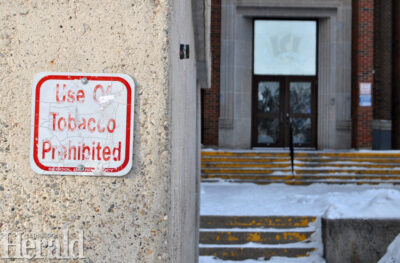Youth vaping a constant battle for teachers
By Lethbridge Herald on February 23, 2023.
 An AHS presentation at this week's teachers convention says educators are faced with the problem of managing the influx of vaping devices coming through the front doors and into their schools.
Herald photo by Cal Braid
An AHS presentation at this week's teachers convention says educators are faced with the problem of managing the influx of vaping devices coming through the front doors and into their schools.
Herald photo by Cal BraidCal Braid – LETHBRIDGE HERALD – Local Journalism Initiative Reporter
The South Western Alberta Teacher’s Annual Convention began Thursday at the University of Lethbridge. A morning workshop presented by Alberta Health Services (AHS) focused on the issue of vaping, tobacco, and cannabis use by underage students.
Educators are faced with the problem of managing the influx of vaping devices coming through the front doors and into their schools. Possession of vaping products, cigarettes and cannabis is illegal for persons under 18, and across the board, vaping has become more popular than cigarette smoking in most schools.
Chloe Trautman and Courtnay Epp, both health promotion facilitators with AHS hosted the presentation. Trautman works with the population health promotion team and Epp with the school health and wellness promotion team. The hour-long workshop looked at trends, resources, and supports that AHS can offer schools. It also gave teachers a chance to talk about their experiences, and most of those revolved around vaping. Cannabis and cigarettes received less attention.
In discussion among the teachers, the general consensus was that school bathrooms are the hot spot for vaping infractions. Vaping devices are easy to hide so it’s a constant battle.
Vapes are confiscated in some schools; either temporarily until a parent is contacted, or permanently removed and discarded. Other kids use vapes in the parking lot or in a vehicle.
Students can face suspensions for violating school policy and the law, but Trautman suggested “restorative justice” over straight up punishment. Restorative justice is generally a small group discussion in which an offender, a victim, a mediator, and possibly others discuss the impacts of a negative action and encourage the offender to make changes or amends in a personally meaningful way. The focus is on people and relationships, and Trautman promoted the idea.
Epp insisted that “scare tactics don’t work,” and one teacher said that kids will “justify their use” because vaping is better than cigarettes and that it calms them. Some of the risk factors at work are individual and interpersonal.
The development of decision making, problem solving, self-concept, critical thinking, and coping skills is a crucial part of growing up. Mental health status is a contributor, as are the attitudes of family and friends.
Use among family members, pressure from peer groups, and unhealthy social attitudes towards substance use all affect developing brains in different ways. In the community, increased availability and increased exposure to marketing are risk factors, and Trautman said socioeconomic status is a risk factor, too. Lifestyle patterns vary among status groups, and can lead to either healthier or unhealthier habits based on where a student lands in that spectrum.
In school, poor academic achievement, peer rejection, stigma towards accessing mental health or addiction supports, and normalization of use can all play a role in a students substance habits.
Epp discussed effective prevention, saying “it’s mostly based upon social competencies and skill building versus substance specific education, especially in that grade seven to nine age group.” She introduced the Comprehensive School Health framework as “Alberta’s roadmap to school health. It touches on all aspects of school life.” The components are social and physical environments, teaching and learning, policy, and partnerships and connections within the school and community.
“Young people definitely start an unhealthy behaviour for lots of different reasons,” Epp said. “Lack of skills required to resist influences, having low self-efficacy for refusal, or having low self-esteem. It only makes sense to help them build social competencies.” She also suggested using the Blueprint for Action from the Government of Canada website.
She offered AHS resources that can help teachers and students navigate the rocky terrain of the teen years. Visit http://www.ahs.ca/tobaccovapingprevention
15-14




